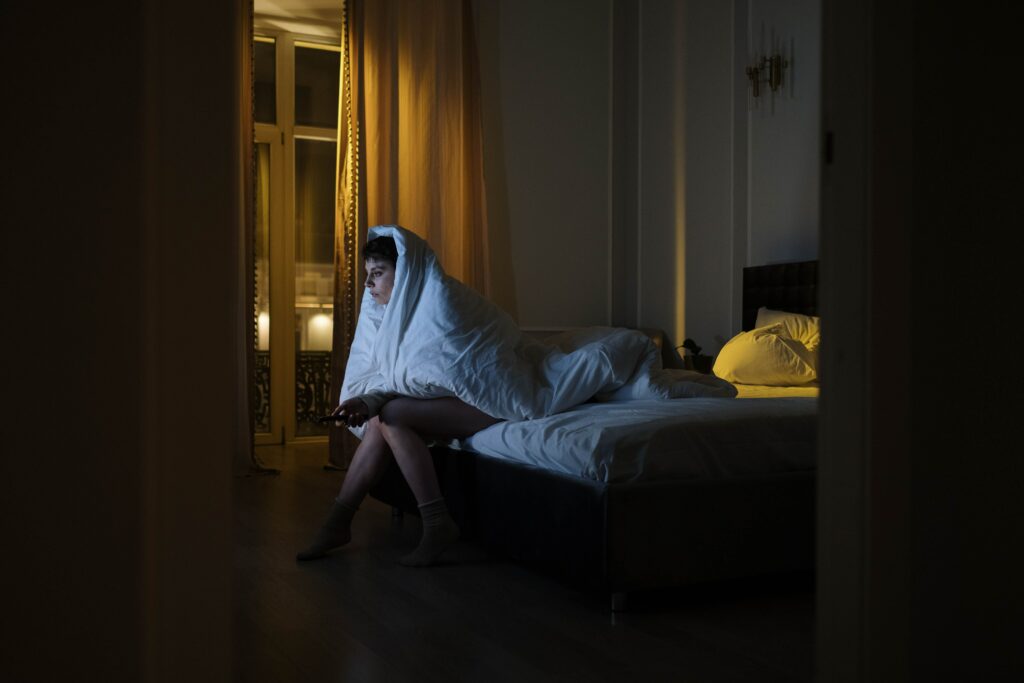Anxiety can come from a combination of factors. Conditions, both external and internal, can trigger anxious feelings. Even something as small as a phone notification can lead to anxiety. And while some people may have multiple triggers, for others, anxiety can be triggered for no reason at all. Learn about the most common anxiety triggers, how to identify them, and coping methods below:
Your Smartphone Can Trigger Anxiety
It seems impossible to peel our eyes away from our phones these days. Every aspect of our lives seems to revolve around this indispensable, omnipresent aspect of our daily life. However, the constant influx of information and the barrage of alerts coming from our phones can trigger feelings of anxiousness and worry.
Our body’s stress response also called our “fight or flight response,” is a biological process where our brain scans for threats in our surroundings, identifies them, and triggers a well-orchestrated physiological response to help us fight or flee. Unfortunately, our brain also reacts to non-life-threatening stressors—such as an untimely phone notification from work. Now imagine receiving a constant stream of stressful information every hour of the day. This keeps our stress hormones activated and always on “high alert.” Repeated activation of our stress response system takes a toll on our body over time.
Maria Mouratidis, PsyD, a licensed clinical psychologist at The Retreat at Sheppard Pratt, stated in a Healthline article that “having devices literally in our hands all of the time keep us in a state of alertness that can be draining over time. The amount and type of information are not often filtered for urgency or importance.” As a result, it’s difficult for us to relax or slow down when we’re supposed to unwind. For example, it’s challenging to enjoy a meal when we receive a distressing notification in the middle of eating. When we’re at the end of our day ready for bed, “doomscrolling” through our social media feed makes it hard for our brains to power down.
Smartphones make us available 24/7, increasing social and work expectations. Current smartphone features and apps support modern business demands, such as instantly responding to emails and taking calls. Because of this, many employers anticipate having their employees available even after the usual working hours. This expectation can sometimes instill fear and worry when we cannot respond immediately. In addition, receiving constant work notifications makes it hard for employees to unwind after a long day.
Social media brings a new level of anxiety to our lives, and consistent usage can take an emotional toll on our mental well-being. Seeing desirable images on social media, even though we know what we’re seeing is filtered, can make us feel insecure about how we look and what’s happening in our daily lives. This can exacerbate feelings of FOMO or Fear of Missing Out.
Smartphones have become an essential tool in modern society, but how we use them can harm our overall health. It stimulates our stress activation system, hindering relaxation, disrupting sleep patterns, and elevating stress levels. Therefore, it’s essential to establish healthy boundaries and limit our use of these personal devices.

Every person is different, and different circumstances can trigger anxiety. Therefore, the list below is not exhaustive but explains five common anxiety triggers experienced by people living with anxiety disorders.
1. Too Much Caffeine
Caffeine works wonders for our productivity but can also trigger or worsen anxiety. Drinking coffee increases epinephrine levels in our body—one of the many hormones that activate our fight-or-flight response.
Patients with existing anxiety disorders are particularly sensitive to the anxiogenic effects of caffeine. Moreover, caffeinism, a condition of intoxication marked by agitation, restlessness, rambling thought and speech, excitement, and insomnia, is brought on by excessive intake of caffeine. These symptoms overlap with many psychiatric disorders, including anxiety. Consume caffeine safely, preferably less than 400mg per day, to avoid triggering feelings of anxiousness.
2. Not Enough Sleep
A lack of sleep is linked to a slew of mental and physical health issues, including anxiety. It increases irritability and overall stress levels because our bodies and brains aren’t getting enough rest. This can lead to a vicious cycle. According to the Division of Sleep Medicine at Harvard Medical School, sleep deprivation can cause anxiety which in turn causes insomnia and other sleep problems. Our worries and anxious thoughts prevent us from getting a good night’s sleep, and when our brains can’t rest, our anxiety levels rise.
3. Skipping Meals
A lack of proper nutrition can exacerbate existing symptoms of anxiety. Skipping meals may cause our blood sugar to drop and increase our body’s cortisol levels. Increased cortisol levels stimulate a stress response. When we regularly skip meals, our body’s stress response stays constantly on which takes a toll on the body and contributes to feelings of anxiousness. Whatever your reason for skipping a meal, remember that it can harm your mental health, too.
4. Health Issues
A health issue as seemingly minor as a bad back or something more serious like cancer can trigger anxiety. One’s physical well-being can often significantly impact one’s mental health. Receiving a diagnosis for an illness can cause fear about the future and what it holds for a person. They have to deal with the stress of their current situation and also worry about how their loved ones will cope emotionally and financially. There’s also the fear of how a health problem will progress quickly and that they might not be prepared to handle what the future holds.
5. Financial Concerns
For many people, these symptoms are triggered by financial stress. A job loss, a medical emergency, or the inability to pay rent can make one feel they are “spiraling” and out of control. Money is linked to survival. When we think that money is insufficient for our daily needs, it activates our survival instincts and heightens our anxiety levels.
Tips for Identifying Anxiety Triggers

The more you know about your triggers, the more you can prevent anxious feelings from happening. It’s helpful to be aware of your own triggers before they can do more damage. Here’s a list of how to get started.
1. Start a journal.
A journal is a great place to start when trying to identify your anxiety triggers. Journaling your thoughts helps you see patterns and links that might not be obvious. Try writing in a journal for a week. At the end of each day, record what happened during the day that made you feel anxious or stressed. After a few weeks, look back over your notes and see if any patterns emerge. Journaling daily allows you to learn more about your behavior and practices. You’ll also see what helps calm you down and worsens your anxiety.
2. Work with a therapist.
If no patterns stand out after journalling for several weeks, it’s time to try something different. Seek help from a therapist or counselor who can guide you through some exercises to identify your triggers. Professionals can help determine what sets you off and teach calming techniques to ease your mind.
You can also try Emotional Freedom Technique (EFT), a self-help technique to help you feel better when experiencing emotional distress. EFT is also called tapping because you tap your fingertips on certain parts of your body. You can work with EFT institutions like The Pro EFT Center to get started.
3. Listen to your body.
Certain foods profoundly impact our mood, stress levels, and mental health. Some can trigger anxiety, too. For example, caffeine, sugar, processed food, and alcohol can raise cortisol levels and anxiety in certain circumstances. Track what you’re eating and drinking and the associated moods after consumption. Paying attention to what you eat and how it affects you is a helpful first step to identifying your triggers. Jot it down in your journal, and watch out for any patterns.
4. Be honest with yourself.
Often, our past adverse experiences become associated with a certain situation or place. As a result, even though we may be experiencing something entirely different, our brain still reacts as if it’s in danger. Take some time and reflect on how your past negative experiences are affecting you today. It can sometimes be hard to be honest with yourself when reflecting on the past, but it can help pinpoint triggers.
The pandemic created a flurry of negative emotions for most of us. Labeling these emotions can help us soothe our minds and reduce the stress associated with those emotions. Identifying your feelings takes practice and a lot of honesty, but it’s worth it in the end.
How to Manage Common Anxiety Triggers

Managing life with anxiety can feel overwhelming at times. But, even though it’s not always possible to avoid triggers, there are daily practices you can do to address them:
1. Establish healthy habits.
Improve your overall well-being and establish a healthy lifestyle. Get enough exercise, eat a balanced diet, limit caffeine, and get adequate sleep. Exercise helps relieve stress and anxiety by releasing endorphins — feel-good chemicals in the brain that help you relax. Eat a well-balanced meal with vegetables, healthy fats, and lean meat. Avoid processed foods and sugary drinks for steadier blood sugar and cortisol levels. All these can improve your overall mental and physical wellness. Make conscious choices that can help you feel your best physically and mentally.
2. Try meditation and yoga.
Meditation and yoga are centuries-old practices that help ease mental and physical tension. They are both ancient practices used for centuries to create inner peace.
When we talk about yoga, we often think of its physical benefits, but its benefits extend beyond our bodies. Yoga allows us to focus on our body’s energy and how our body feels when we’re doing different poses. It helps us become aware of our breathing, allowing us to focus on the moment instead of letting our minds wander into anxious thoughts.
Like yoga, meditation increases our ability to stay focused in the present moment. In addition, it helps reduce anxious thoughts and foster a sense of equilibrium, calmness, and mindfulness. Start your meditation practice with this guide from Mindful.org.
3. Limit your smartphone and social media usage.
Decide on what type of relationship you want to have with your smartphone and social media, and establish boundaries. Set limits on when and where you use your phone. Turn off notifications during important hours of the day so they don’t distract you from completing tasks or making time for loved ones. The newer phones today have the option to set up a focus mode, allowing you to receive notifications from emergency contacts only.
Not every aspect of your life revolves around your smartphone. Instead of scrolling through your phone during breaks, read a book or start a new hobby. Use your phone to call a loved one instead of checking social media. While our modern life has made it hard to follow the recommendations, remember that there are other ways to fill our days.
4. Work on positive self-talk.
Self-talk is our internal dialogue influenced by our subconscious. It’s also a way for our brains to process our daily experiences. Talking more positively to ourselves can significantly affect our mood and helps increase our satisfaction in life. Switching our thoughts to more positive ones and letting go of negative thinking and perfectionism reduces self-imposed pressure and decreases overall anxiety levels.
While this alone cannot prevent all triggers, it allows us to redirect our minds to more beneficial thoughts. If you think you can’t do this alone, a mental health professional can help steer you in the right direction.
5. Make a plan.
Whether it’s related to managing finances or health concerns, creating a plan can help you feel more in control of your current situation and reduces your worries. For example, if one of your anxiety triggers is the fear of failing, break down the issue into smaller elements you can handle. It can turn an insurmountable task into bite-sized chunks you can tackle daily. Planning can also help you stay positive and keep you from being overwhelmed by stressful situations or uncertainty.
It's Not Just You
Anxiety affects 40 million adults in the U.S. alone. It’s common, and you are certainly not alone. Anxiety isn’t just our state of mental health as an individual, but it’s also about the world we live in. More than just our habits and behaviors, culture, economy, politics, and society also shape our mental health.
When your anxiety feels out of control already, seek professional help. Start a conversation with your primary care practitioner so that they can create a plan to manage triggers and ease your symptoms.













